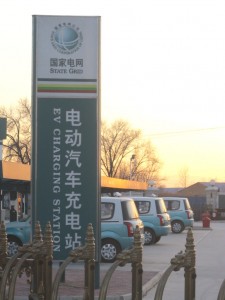Great Wall of China gets electric taxi service

BEIJING -- Travellers to China have a new way to reach the country's most famous landmark – electric taxi. Yanqing, a rural county just over 10 miles away from the Great Wall, has launched a fleet of 50 taxis powered purely by electricity.
The taxis are made by a Beijing-based car company, Foton. According to the firm’s publicity, the vehicles are capable of travelling 200km (about 125 miles), and can achieve 70% charge in just half an hour.
The half-turquoise electric cabs have been visible on the streets of Yanqing since March, but local taxi drivers said that the vehicles could only travel around 100km (about 60 miles) on a single charge. Beijing’s bitingly cold winter temperatures are taking a toll on the taxi’s lithium-ion batteries. “My car doesn’t travel as far it did in the Summer, the maximum distance has fallen by about 20 percent,” one taxi driver, who asked not to be named, said.
So far there is only a single bank of charging stations for the Taxis, which has the capacity to charge 50 cars simultaneously. The bank appears to use slow-charging technology. “We have to recharge the cars everyday” one taxi driver said. “It takes about 8 hours.”
The rules of the scheme forbid the drivers from carrying passengers from rural Yanqing County to the center of Beijing, which keeps their earnings low. “I made more money driving a normal petrol-powered taxi downtown than I do now,” one driver said. But drivers participating in the scheme pay around two thirds less for renting their vehicles than other Beijing taxi drivers, and most of them live locally. “The job is less stressful than driving in the city, and I can go home for lunch,” the driver said.

Beijing is not the first city in China to launch an electric taxi pilot scheme. Shenzhen, in southern China, has put 100 electric taxis on its roads, and plans to increase that figure to 3000 by 2015. Both cities picked local car manufacturers to provide them with vehicles. Government officials in China are likely to favour locally based firms because they make a bigger contribution to the local GDP figures on which their careers are assessed.
At the moment, it’s questionable how ‘green’ the taxi project is - Beijing relies on coal-power for nearly all of its electricity needs, though the city plans to boost natural-gas electricity generation to 20% over the next four years. The head of the Yanqing’s taxi department, who works in a office plastered with fading maps of the great wall and complete with a bed for afternoon naps, declined a request for an interview. “We do our best to serve the public, and don’t want publicity,” he said.
In the shadow of the mountain range where the great wall was built, Yanqing locals seemed satisfied with the taxis. A lack of officially registered taxis in the county required locals to bargain for a fare with private taxi drivers, but the electric taxis have a fixed starting price of 5 RMB, half the price of traditional taxis in Beijing. “The taxis are cheap to ride, but there still aren’t enough of them,” Wu You, a local resident, said.
Anyone itching to take an electric cab to the great wall can take a train or bus from downtown Beijing to Yanqing, and flag down a taxi from there. “We’re pretty reliant on tourism out here,” one Yanqing taxi driver said. “And getting to the great wall in an electric taxi won’t be a problem.”
Photo: Chinaautoweb; Author
This post was originally published on Smartplanet.com
